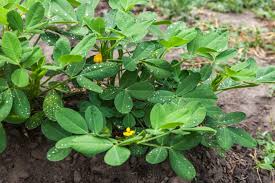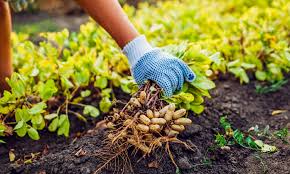Peanuts are yummy little legumes that grow underground. They come in a hard shell, hiding the delicious nut inside. These nuts are packed with goodness and loved by many around the world.
When you crack open a peanut shell, you find a small, brown nut that is not only tasty but also quite nutritious. Peanuts are a great source of protein, which is important for our bodies to grow strong and stay healthy. They also have healthy fats that our bodies need to function properly.
These little nuts are not just good for you; they’re versatile too. You can eat them roasted, boiled, or even in the form of creamy peanut butter. Peanut butter is a smooth spread made from ground peanuts, and it’s a favorite for sandwiches and snacks. Kids and adults alike enjoy the rich, nutty taste.
But peanuts aren’t just about flavor; they also play an important role in agriculture. Farmers cultivate peanuts in fields, where the plants develop small yellow flowers. After the flowers bloom, they transform into pods that hold the peanuts. This process is fascinating and contributes to the cycle of life.
Apart from being tasty and nutritious, peanuts have a fascinating history. They are believed to have originated in South America and were later introduced to the world by explorers. Over time, peanuts became a staple food in many cultures, appreciated for their versatility and ability to thrive in various climates.
In addition to being a popular snack, peanuts also find their way into many dishes. They can be sprinkled on salads, added to stir-fries, or even used to make savory sauces. The culinary possibilities are endless, making peanuts a kitchen essential for many chefs.
Peanuts also have a social side. Have you ever been to a baseball game or a circus? Chances are you’ve seen people enjoying peanuts while watching the show. Peanuts are often associated with fun events and gatherings, bringing people together over a shared love for these crunchy treats.
In addition, peanuts are not just nuts; they’re a delightful part of our lives. From their nutritious qualities to their versatility in the kitchen, peanuts have earned their place in our hearts and on our plates. So, the next time you enjoy a handful of peanuts or spread some peanut butter on your toast, savor the moment and appreciate the simple joy that peanuts bring.
Read Also: Guide to Proper Management of Weaners
How to Grow and Care for Peanut

To grow peanuts, start by selecting a sunny spot in your garden. Peanuts love sunlight! Plant the seeds directly in the soil about 1 to 2 inches deep and 8 to 10 inches apart. Make sure the soil is well-drained, as peanuts don’t like soggy feet.
1. Watering: Peanuts need consistent moisture to grow well. Water the plants regularly, ensuring the soil stays moist but not waterlogged. Be mindful of dry spells and increase watering during these times. Avoid overhead watering to prevent fungal diseases; instead, water the base of the plants.
2. Soil Requirements: Peanuts thrive in well-drained, sandy soil. Ensure the soil is loose and has good aeration. Adding organic matter, like compost, can improve soil structure. Peanuts don’t appreciate heavy clay soils, so amending with sand or perlite can help.
3. Fertilizing: Provide your peanut plants with a balanced fertilizer when they begin to flower. Avoid excessive nitrogen, as peanuts are nitrogen-fixing plants and can make their own. Follow the recommended application rates on the fertilizer package.
4. Weeding: Keep the area around your peanut plants weed-free. Weeds compete with peanuts for nutrients and water. Regularly check for weeds and remove them to give your peanuts the best chance to grow.
5. Harvesting: Peanuts are ready to harvest when the leaves turn yellow and the peanuts inside the shells have matured. Carefully dig up the plants, being cautious not to damage the peanut pods. Allow the peanuts to air-dry for a few days before removing them from the plants.
6. Drying and Curing: After harvesting, let the peanuts dry for about two to three weeks in a well-ventilated area. This drying process helps improve the flavor and ensures the peanuts are ready for storage. Once dried, store them in a cool, dry place.
7. Pest and Disease Management: Keep an eye out for pests like aphids or beetles. Insecticidal soap or neem oil can be effective against these pests. Be vigilant for diseases like leaf spot or rust, and promptly remove any affected plants to prevent the spread.
8. Crop Rotation: If possible, practice crop rotation. Avoid planting peanuts in the same spot year after year to reduce the risk of soil-borne diseases and pests.
9. Enjoying Your Peanuts: Once you’ve successfully grown and harvested your peanuts, the possibilities are endless. Roast them for a tasty snack, make homemade peanut butter, or add them to your favorite recipes. Growing your own peanuts is not only rewarding but also a fun and educational experience.
Read Also: Guide to Proper Management of Growing and Finishing Pigs
Uses of Peanut

Here are the Versatile Uses of Peanuts:
1. Snacking: The most common and straightforward use of peanuts is as a snack. Whether you prefer them roasted, salted, or in mixed nut assortments, peanuts make for a delicious and satisfying munch.
2. Peanut Butter: A classic favorite, peanut butter is a versatile spread loved by many. Enjoy it on sandwiches, toast, crackers, or as an ingredient in smoothies and desserts.
3. Cooking and Baking: Peanuts can be a wonderful addition to various dishes. Add them to stir-fries, salads, or use them as a crunchy topping for ice cream. In baking, peanuts can enhance the flavor and texture of cookies, brownies, and cakes.
4. Asian Cuisine: Peanuts are a staple in many Asian cuisines. They are used in sauces, noodle dishes, and stir-fries, adding a unique nutty flavor and satisfying crunch.
5. Trail Mix: Create your own custom trail mix by combining peanuts with dried fruits, seeds, and other nuts. It’s a convenient and energy-boosting snack for hikes or on-the-go moments.
6. Peanut Oil: Extracted from peanuts, peanut oil is often used in cooking and frying due to its high smoke point. It adds a distinctive flavor to dishes and is a common choice in Asian and African cuisines.
7. Peanut Brittle: This sweet treat combines peanuts with a sugary, brittle coating. It’s a delightful and crunchy candy that’s often enjoyed during holidays or as a homemade indulgence.
8. Peanut Sauce: A flavorful sauce made from peanuts can be used in a variety of dishes, from dipping sauces for spring rolls to a base for satay or curry dishes.
9. Protein Boost: Peanuts are a good source of plant-based protein. Incorporate them into vegetarian or vegan meals to enhance protein content.
10. Garnish: Crushed or chopped peanuts make a fantastic garnish for dishes like salads, soups, and desserts, providing both texture and flavor.
11. Peanut Flour: Ground peanuts can be used to make peanut flour, which can be used in baking or as a thickening agent in sauces and stews.
12. Peanut Tea: In some cultures, roasted peanuts are used to make a unique and aromatic peanut tea. It’s a cozy and warm beverage enjoyed in various regions.
Remember, the versatility of peanuts extends beyond these examples, and experimenting with different culinary creations can lead to new and exciting uses for this beloved legume.
Importance of Peanut
The Importance of Peanuts:
1. Nutritional Powerhouse: Peanuts are rich in essential nutrients, including protein, healthy fats, fiber, vitamins (such as niacin and folate), and minerals (such as magnesium and phosphorus). This makes them a valuable component of a balanced and nutritious diet.
2. Protein Source: Peanuts are an excellent source of plant-based protein, making them a crucial dietary component for vegetarians and vegans. Protein is essential for muscle development, repair, and overall body function.
3. Heart Health: The healthy fats found in peanuts, including monounsaturated and polyunsaturated fats, contribute to heart health by reducing bad cholesterol levels. Regular consumption of peanuts has been associated with a lower risk of cardiovascular diseases.
4. Energy Boost: Packed with calories and nutrients, peanuts provide a quick and sustainable energy boost. This makes them an ideal snack for active individuals, athletes, and those needing a convenient source of energy.
5. Weight Management: Despite their caloric density, studies suggest that including peanuts in a balanced diet may contribute to weight management. The combination of protein and fiber helps in promoting satiety, reducing overall calorie intake.
6. Blood Sugar Regulation: Peanuts have a low glycemic index, which means they have a minimal impact on blood sugar levels. This makes them a suitable choice for individuals with diabetes or those aiming to manage blood sugar levels.
7. Agricultural Importance: Peanuts play a significant role in agriculture as they are a nitrogen-fixing crop. This means they have the ability to improve soil fertility by capturing nitrogen from the air and converting it into a form that plants can use.
8. Economic Impact: Peanuts are a major cash crop in many regions, contributing significantly to the economy. They provide livelihoods for farmers, employment opportunities in processing industries, and contribute to global trade.
9. Culinary Diversity: Peanuts add depth and flavor to a wide variety of dishes across different cuisines. From savory sauces and stews to sweet treats and snacks, the culinary versatility of peanuts enhances the taste and texture of many recipes.
10. Community and Cultural Significance: Peanuts are often associated with cultural traditions, social gatherings, and events. Whether enjoyed at ball games, festivals, or family gatherings, peanuts have a way of bringing people together.
11. Global Accessibility: Peanuts are a widely accessible and affordable food source, providing essential nutrients to diverse populations worldwide. This accessibility makes them a valuable tool in addressing food security and malnutrition issues.
In summary, the importance of peanuts extends beyond their delicious taste. From promoting health and nutrition to contributing to agriculture and economies, peanuts play a vital role in various aspects of our lives.
Read Also: A Guide to Waste Management Case Studies

